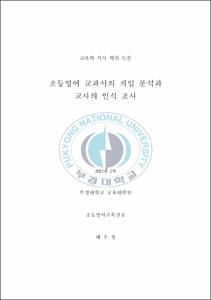초등영어 교과서의 게임 분석과 교사의 인식 조사
- Abstract
- The purpose of this study is to analyze the games in the 4th grade elementary school English textbooks of four different publishers. This study also aims to survey the teachers' opinions of the types of the game, and the studentspreference for them, and the difficulties that the teachers have when they use games in English class.
For this purpose, five categories of analysis were set up as a result of the review of the previous researches. The five categories are the language skills used chiefly for the game, the aim of the game, the winning elements of the game, the organization of learners and the presence of physical response in the game. I also surveyed which type of games teachers and students prefer through the questions for teachers.
The result of this study are as follows.
First, in terms of the language skills used chiefly for the game, the number of the games for speaking and listening is higher than the number of them for reading and writing. Also, there are some games which involve more than two skills. Teachers have a positive opinion for listening, speaking and reading games but a negative opinion for writing ones. It is because there aren't enough writing games in the textbook.
Second, in terms of the aim of the game, most of the games were for the practice of language forms, while a few were games for communication. Students and teachers also prefer the games intended for the practice of language forms to the games for communication.
Third, in terms of the winning elements of the game, the number of the games based on the students' ability was higher than the number of the games based on luck. However, students were more interested in the games based on luck. Teachers answered that the effectiveness of the two kinds of the game was same.
Fourth, in terms of the organization of learners, some textbooks had more game of the group work, while other textbooks had more game of the whole-class work. Teachers liked the group work the best, the whole-class work secondly, the pair work and the individual work lastly. They thought that the group work was the most effective.
Fifth, in terms of the presence of physical response in the game, the number of the games which include students' physical response like moving or singing or dancing is higher than the number of the games which don't include students' physical response. However teachers thought that the games which include students' physical response are much more effective.
Some suggestions concerning the result of this study are come up with as follows. First, there should be same amounts of games which involve speaking, listening, reading and writing. So more games of reading and writing are needed. Second, more games for the practice of language forms are needed same as at present. Third, more games based on luck are needed. Fourth, there should be more games of the group work than those of the other forms of organization. Fifth, there should be more games which include students' physical response like moving, singing or dancing.
- Issued Date
- 2012
- Awarded Date
- 2012. 2
- Type
- Dissertation
- Publisher
- 부경대학교
- Department
- 교육대학원 초등영어교육전공
- Advisor
- 오준일
- Table Of Contents
- 목차 ⅰ
영문초록 ⅲ
Ⅰ. 서론 1
1. 연구의 필요성 및 목적 1
2. 연구 질문 3
3. 연구의 제한점 4
Ⅱ. 이론적 배경 5
1. 초등학생의 특성 및 초등영어교육 5
2. 게임의 정의 및 특성 9
3. 게임의 효과 11
4. 게임의 유형 13
5. 선행 연구 15
Ⅲ. 연구 방법 18
1. 연구 대상 18
가. 분석 대상 18
나. 설문 대상 19
2. 연구 도구 20
가. 게임 분석 기준 20
나. 교사용 설문지 28
3. 자료 수집 절차 및 분석 방법 29
가. 교과서 게임 29
나. 설문 응답 30
Ⅳ. 연구 결과 31
1. 신 ․ 구 영어 교과서의 게임 분석 31
가. 주된 언어 기능 31
나. 게임의 목적 35
다. 승부 요인 36
라. 학습자 조직 형태 39
마. 조작 활동의 유무 41
2. 설문 결과 분석 43
가. 게임 학습에 대한 인식 43
나. 항목별 게임에 대한 교사의 인식 44
다. 게임 지도 시 어려운 점 51
Ⅴ. 결론 및 제언 53
참고 문헌 56
부록 1 59
부록 2 72
- Degree
- Master
- Files in This Item:
-
-
Download
 초등영어 교과서의 게임 분석과 교사의 인식 조사.pdf
기타 데이터 / 1.02 MB / Adobe PDF
초등영어 교과서의 게임 분석과 교사의 인식 조사.pdf
기타 데이터 / 1.02 MB / Adobe PDF
-
Items in Repository are protected by copyright, with all rights reserved, unless otherwise indicated.